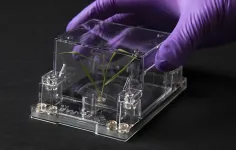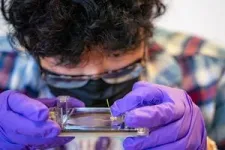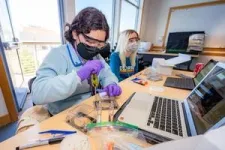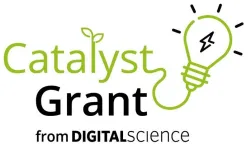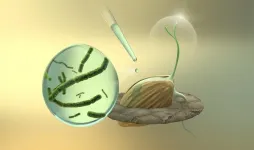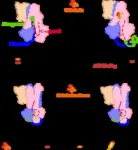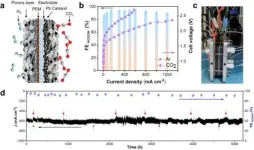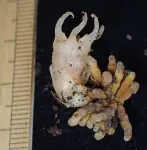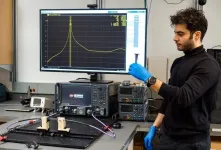– By Will Ferguson
A greater understanding of how plants and microbes work together to store vast amounts of atmospheric carbon in the soil will help in the design of better bioenergy crops for the fight against climate change.
Deciphering the mechanics of this mutually beneficial relationship is challenging, however, as conditions in nature are extremely difficult for scientists to replicate in the laboratory. To address this challenge, researchers at Lawrence Berkeley National Laboratory (Berkeley Lab) created fabricated ecosystems or EcoFABs.
In a new paper in Science Advances, they show how these takeout box–sized, plastic growth chambers could potentially provide scientists around the world with a standardized and reproducible platform for conducting experiments on model plants and the microbes that live around their roots.
This could in turn expedite research into the development of improved bioenergy crops capable of growing in nutrient-poor soils and absorbing more carbon from the atmosphere than is currently possible.
“The overarching idea behind EcoFABs is that there is a real need for a platform in plant microbiome research that enables scientists to better share data and build on each other’s work,” said Vlastimil Novak, lead author of the paper and a project scientist in Berkeley Lab’s Environmental Genomics and Systems Biology (EGSB) Division. “At the moment, there are around 20 laboratories that are using our devices, but we would eventually like to make them more broadly accessible to anyone in the world.”
For the study, Novak and colleagues in Trent Northen’s lab used EcoFABs to test how different forms of nitrogen affect the production of organic substances given off by the roots in Brachypodium, a small grass species used as a model for bioenergy grasses.
Nitrogen is essential for plant growth, and Novak noticed in the literature that its relationship with root exudation, or the types of compounds produced by a plant’s roots, had not been well explored in this grass species.
He and his collaborators conducted experiments supplying Brachypodium with different nitrogen sources – ammonium, nitrate, or a combination – and observed changes in root exudate composition. They found that varying levels of nitrogen affected the type of compounds produced by the roots and that the plants grew best when they received both ammonium and nitrate.
One interesting finding was the production of dopamine in the root exudates only when both ammonium and nitrate were present together. This suggests that specific nutritional conditions influence the production of certain metabolites which could in turn affect plant growth.
“The outcomes of this research can inform nutrient management practices, fundamentally saying that for Brachypodium or similar grasses, it is essential to supply both ammonium and nitrate simultaneously for optimal growth,” Novak said. “It also gives us ideas of some pretty interesting organic compounds in the root microbiome to investigate in the future.”
EcoFABs could ultimately be combined with advances in robotics and AI learning to dramatically increase the speed of discovery in plant microbiome research. Another up-and-coming development at Berkeley Lab is something called the EcoBOT, an automated robotic system that can run EcoFAB experiments autonomously.
“We could ultimately design experiments on a computer and then it does everything for you,” said Pete Andeer, an EGSB research scientist who worked with Northen to design the EcoFAB. “That would be the end goal: integration of these EcoFAB devices with the EcoBOT system.”
A great tool for learning
In addition to providing a plethora of benefits for professional scientists, EcoFABs are also making an imprint in the classroom where they are being used both by high school and community college students as a platform for learning in California.
The Northen lab’s current EcoFAB outreach activities involve collaborations with various educational institutions, including local high schools and Los Medanos College. Since 2020, high school students participating in the Berkeley Lab Director’s Apprenticeship Program have conducted experiments using EcoFABs to study plant growth under different nitrogen conditions. The research project continues to be a highlight of the program with many students gaining interest in biology and laboratory research as a result.
“EcoFABs allowed us to discuss microorganisms in the classroom in a way that connected other units,” said Christina McGhee-Esquivel, a biology teacher at Skyline High School in Oakland who learned about EcoFABs when she was a teacher fellow with Berkeley Lab’s K-12 team in 2021. “This was incredibly important for students to get to see not just how roots grow, but to understand microbial communities.”
Further collaborations with organizations like Biotech Partners aim to introduce biotech education, including the use of EcoFABs, to minority-serving high schools across the Bay Area. Additionally, discussions are underway to integrate EcoFABs into more undergraduate education at Los Medanos College where students will have the opportunity to design and conduct their own plant experiments again in summer 2024.
“Research is not traditionally a part of the community college experience, but many of our STEM students want to transfer and go on to do research or work in labs, internships, those types of things,” said Jill Bouchard, a biology professor at Los Medanos College. “Getting them experience with research is really important to us. And this has been a wonderful way to do it.”
This research and technology development was supported in part by the Department of Energy’s Office of Science.
###
Lawrence Berkeley National Laboratory (Berkeley Lab) is committed to delivering solutions for humankind through research in clean energy, a healthy planet, and discovery science. Founded in 1931 on the belief that the biggest problems are best addressed by teams, Berkeley Lab and its scientists have been recognized with 16 Nobel Prizes. Researchers from around the world rely on the Lab’s world-class scientific facilities for their own pioneering research. Berkeley Lab is a multiprogram national laboratory managed by the University of California for the U.S. Department of Energy’s Office of Science.
DOE’s Office of Science is the single largest supporter of basic research in the physical sciences in the United States, and is working to address some of the most pressing challenges of our time. For more information, please visit energy.gov/science.
END
